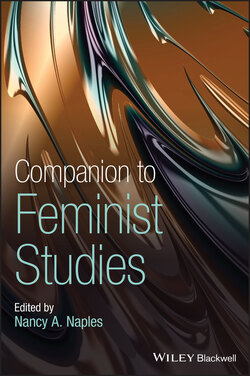Читать книгу Companion to Feminist Studies - Группа авторов - Страница 14
Introduction
ОглавлениеFeminist Studies is an expression of the theoretical and interdisciplinary underpinnings of women's and gender studies. It is a diverse and ever‐changing field that is contoured by the intersecting goals of understanding and theorizing the ways that social life is organized by complex “relations of ruling” that shape social institutions and “everyday life” (Smith 1989), and how individuals and communities organize for social justice and social change. These are manifest within social, political, cultural, and economic institutions, social media, and everyday interactions. The presence and expression of Feminist Studies varies within disciplines and interdisciplines and across regions, as demonstrated by the authors of the 24 chapters in this Companion.
While feminist studies has a long history, it became institutionalized in academia beginning in the 1970s, through courses offered in different disciplines like English, History, Sociology, or Anthropology. These efforts contributed to cross‐disciplinary advocacy for the establishment of Women's Studies programs where faculty designed interdisciplinary courses in response to the deepening intellectual project. In the US, Feminist Studies has found an institutional foothold in some universities as a stand‐alone program or department. The Feminist Studies Program at the University of California, Santa Cruz was founded in 2013. They describe their mission as “challenging existing disciplinary boundaries and fostering a reconsideration of the relationships between knowledge, power, and expertise” (https://feministstudies.ucsc.edu/graduate). It is now a department that trains students for academic careers as well as for public policy and human rights advocacy and research. In describing its graduate education in Feminist Studies, it notes that:
The roots of Feminist Studies lie in the study of women's experiences and a critique of their neglect in knowledge production. But the name “Feminist Studies” reflects the fact that the subject matter includes more than women: research and teaching focus on the ways that relations of gender, intersecting with race, class, ethnicity, sexuality, nationality, age, religion, ability, and other categories of difference, are embedded in social, political, and cultural formations. Feminist Studies encompasses teaching and research interests in men and masculinities and sexualities, as well as women.
(Feminist Studies n.d., UCSB)
Graduate training in Feminist Studies draws on diverse critical epistemologies and interdisciplinary approaches. For example, the University of Washington's Graduate Program in Feminist Studies centers “Intersectional, Decolonial, Indigenous, Queer and Transnational feminisms” and encourages “research informed by Black Studies, Latina/o Studies, Asian American Studies, Latin America, East Asia and South Asia Studies and the disciplines including Anthropology, Cultural Studies, History, Political Science, Psychology and Sociology” (https://gwss.washington.edu/feminist‐studies‐doctoral‐program).
The US has a strong emphasis on undergraduate training, while in other countries, the focus has been primarily on graduate education (see Tambe and Montague in Companion to Women's and Gender Studies, 2020). Furthermore, as Tambe and Montague note, feminists in other countries have had different relationships with the state. For example, feminist perspectives have been more effectively integrated in state governance structures than in the US. For example, in Australia, feminist activists were able to incorporate their activism into the state as “femocrats” where they engaged with policy construction and implementation across different arenas, including applying a feminist framework to review of the general state budget (Eisenstein 1989; Mazur 2001; Watson 1990). While their influence has waned over the years (Outshoorn and Kantola 2007), feminist activists have found footholds in other countries where, for example, they have succeeded in passing statutes for greater representation of women in both elected and other governmental positions in France, Pacific Islands, the UK, Scandinavia, and countries in Latin America and Africa, among others (see, for example, Arendt 2018; Baker 2019; Barnes and Córdova 2016; Dahlerup and Freidenvall 2005; Hughes et al. 2017; Johnson Ross 2019; Opello 2006).
Since the field of Feminist Studies draws insights from feminist scholars and activists from many different disciplinary and interdisciplinary sites and diverse local, national, and regional contexts, it is challenging, to say the least, to ensure all voices, perspectives, and contributions are represented. Our solution is to focus attention on many of these contributions by organizing the Companion to Feminist Studies around three different dimensions that are key components of the field and transcend these differences: Feminist Epistemologies and Its Discontents, Methodological Diversity, and Feminist Praxis.
